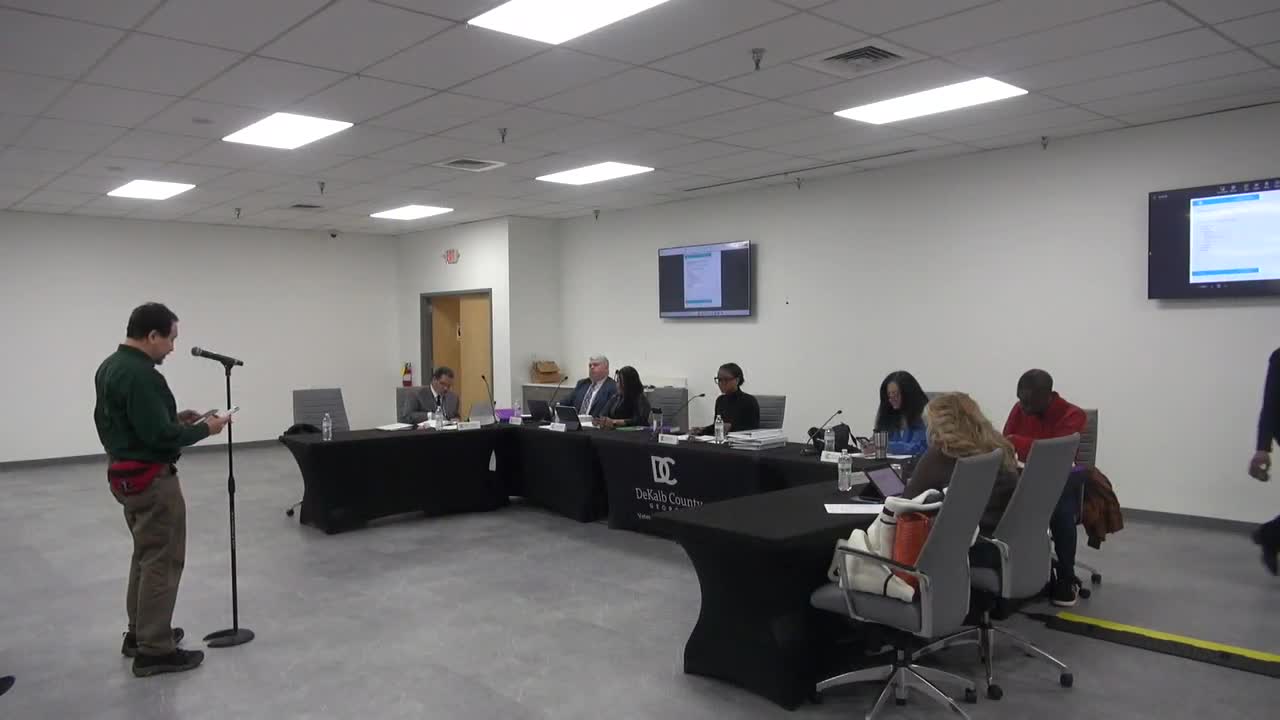DeKalb elections board hears mass voter-roll challenges; public speakers urge caution
Get AI-powered insights, summaries, and transcripts
Subscribe
Summary
The DeKalb County Board of Registration and Elections met in a special session to hear five sets of mass voter‑registration challenges and to consider whether probable cause exists to pursue removals. Public commenters strongly urged caution, saying mass, automated lists risk false positives and possible disenfranchisement.
The DeKalb County Board of Registration and Elections met in a special called session to hear five sets of challenges to voter registrations submitted by two private citizens and to consider probable-cause findings on those challenges.
The meeting drew sustained public comment urging the board not to remove voters and calling the challengers’ methods error-prone. Many speakers — including people who identified themselves as long-time DeKalb residents, poll workers and voting-rights volunteers — said the county should prioritize increasing access to voting and use secure government sources rather than third‑party web scraping to update rolls.
Why it matters: The board must follow Georgia law and its own procedures when handling third‑party challenges. A finding of probable cause is an intermediate step for the kinds of challenges filed under OCGA; some challenges may be withdrawn by challengers and resubmitted under a different statutory pathway. The hearing laid bare tensions between private citizens who say they are policing registration data and voters and advocates who say mass automated lists risk false positives and disenfranchisement.
The challengers grouped the submissions into five categories: (1) 166 registrations the challenger said list a post office box or commercial mailbox as the residential address; (2) 485 electors allegedly flagged by a National Change of Address (NCOA) record as having moved out of state; (3) 4,861 electors alleged to have had no contact with election offices for many years; (4) 79 registrants with “missing” residential addresses; and (5) 173 alleged deceased electors. The board heard a presentation of the basis for each group and then proceeded, item by item, with its probable‑cause process.
Public comment and evidence: Dozens of residents spoke in opposition to broad removals. Michael Beach, identifying himself as a DeKalb County resident, said, “Challenges based on web scraping of public databases have consistently been shown to be error prone.” Janet Grant told the board the challenge list appeared to be generated by “Eagle AI” and warned that public data alone “is not appropriate for taking actions to remove voters from rolls or impair their ability to vote.” Kendra Bogalski, who identified herself as a GOP precinct chair, urged the board to accept evidence from the public and to investigate apparent database errors rather than rely on mass lists.
The challengers’ arguments: Bill Henderson, who presented the largest sets, said he used publicly available address lists and online mapping to identify registrations that list PO boxes or commercial mailbox addresses and compiled what he called individualized printouts. “All I’m asking is that these registrations be looked at,” Henderson said, urging the board to mark questionable registrations as challenged so the registrar could seek residential‑address confirmation. Henderson repeatedly told the board he would withdraw some 2:30‑style challenges and resubmit them under the 2:29 process that can lead to removal if the higher evidentiary standard is later met.
Board procedure and legal standard: Board members and counsel repeatedly emphasized the governing standard and who bears the burden. The chair summarized the board’s procedures and read from the board’s September 12, 2024 rules. Counsel and staff told the public that, for the 2:30 hearing format, “the burden of proof is on the challenger to present probative and individualized evidence sufficient to meet a probable cause standard that the challenged voter does not have the right to vote in the election.” The board also noted that a finding of probable cause typically requires a three‑member majority of the board at this meeting.
Votes and administrative outcomes: The board handled the five grouped challenges sequentially. Where challengers withdrew items or said they would resubmit under 2:29, the board noted that withdrawal and, in some cases, still took a procedural probable‑cause vote. The board explicitly did not find probable cause on one packet of challenges because the motion did not receive the required three‑vote majority; at least one set of challenges — the packet of 173 alleged deceased electors — drew a motion and a board vote that resulted in a finding of probable cause. Several other sets were withdrawn by the challengers and said they would be refiled under a different statutory category for fuller evidentiary review.
Tensions among board members and public: Board members expressed differing views about the value of allowing private challenges. Anthony Lewis, a board member, framed the issue as a citizen petition right and said challengers have standing to call for review: “I see them as exercising the right to petition for a redress of grievances,” he said. Other board members and many speakers emphasized protecting voters from mistaken removals, noting obstacles such as postal delivery problems, homeless residents using service addresses, and limitations in publicly scraped databases.
What’s next: Several challengers said they will withdraw the 2:30 complaints and resubmit as 2:29 challenges, which carry a higher burden and different notice requirements. The board’s regular monthly meeting schedule will include follow‑up items; the chair closed the meeting by thanking staff and the public and noting the next regular meeting date.
Ending: The hearing illustrated the practical and legal friction between private‑party data scrutiny and the statutory protections and procedures meant to avoid mistaken disenfranchisement. The DeKalb VRE staff and board said they will continue to process the filings under Georgia law and the board’s procedures; some challengers signaled they will refile in a different form for fuller evidentiary review.
